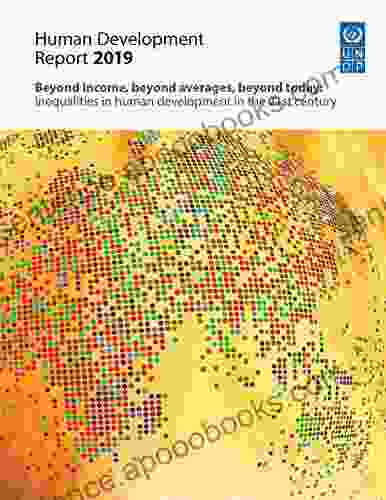Beyond Income, Beyond Averages: Confronting Inequalities in Human Development Today

Human development is a multifaceted concept that encompasses not only economic well-being but also health, education, and other factors that contribute to a person's overall quality of life. While significant progress has been made in improving human development outcomes over the past few decades, significant inequalities persist both within and between countries.
5 out of 5
| Language | : | English |
| File size | : | 37558 KB |
| Screen Reader | : | Supported |
| Print length | : | 364 pages |
| X-Ray for textbooks | : | Enabled |
Traditional measures of human development, such as per capita income, often provide an incomplete picture of the challenges faced by individuals and communities. By focusing on averages, these measures can mask the wide disparities in opportunities and outcomes that exist within societies.
This article will explore the complex factors contributing to inequalities in human development, challenging traditional measures and offering a comprehensive framework for understanding and addressing these disparities.
Beyond Income: A Multidimensional Framework for Human Development
To fully understand the nature of human development inequalities, we need to move beyond income-based measures and consider a wider range of factors that contribute to well-being. The Human Development Index (HDI),developed by the United Nations Development Program (UNDP),provides a comprehensive framework for measuring human development based on three key dimensions:
- Health: Measured by life expectancy at birth, healthy life expectancy, and years of schooling.
- Education: Measured by mean years of schooling and expected years of schooling.
- Standard of living: Measured by gross national income per capita.
The HDI provides a more nuanced understanding of human development outcomes than income-based measures alone. For example, while some countries may have high per capita incomes, they may have low life expectancies or low levels of educational attainment.
The Causes of Human Development Inequalities
The causes of human development inequalities are complex and multifaceted. They include:
- Economic inequality: Disparities in income, wealth, and access to resources can lead to unequal opportunities for health, education, and other aspects of human development.
- Social inequality: Discrimination and social exclusion based on factors such as gender, race, ethnicity, or religion can limit opportunities and outcomes for certain groups.
- Political inequality: Lack of access to political power and decision-making processes can prevent marginalized groups from having their needs and interests met.
- Environmental inequality: Unequal access to clean air, water, and other environmental resources can have significant impacts on health and well-being.
These factors interact with each other in complex ways to create and perpetuate human development inequalities. For example, economic inequality can lead to social inequality, which in turn can lead to political inequality and environmental inequality.
The Impacts of Human Development Inequalities
Human development inequalities have a wide range of negative impacts on individuals, communities, and societies as a whole. These impacts include:
- Reduced economic growth: Inequality can hinder economic growth by limiting the productivity and potential of marginalized groups.
- Increased social unrest: Inequality can lead to social tensions, conflict, and instability.
- Poor health outcomes: Inequality can lead to worse health outcomes for marginalized groups, including higher rates of infant mortality, chronic diseases, and mental illness.
- Reduced educational attainment: Inequality can limit access to education for marginalized groups, leading to lower levels of educational attainment and reduced opportunities for social and economic mobility.
Addressing human development inequalities is essential for creating more just, equitable, and sustainable societies.
A Framework for Addressing Human Development Inequalities
To effectively address human development inequalities, we need a comprehensive framework that includes:
- Economic policies: Policies that promote economic growth and reduce inequality, such as progressive taxation, minimum wage laws, and social safety nets.
- Social policies: Policies that promote social justice and equity, such as anti-discrimination laws, affirmative action programs, and social programs that provide support to marginalized groups.
- Political reforms: Reforms that increase political participation and representation for marginalized groups, such as electoral reforms, campaign finance reforms, and constitutional amendments.
- Environmental policies: Policies that promote environmental sustainability and reduce environmental inequality, such as investments in renewable energy, clean water infrastructure, and sustainable agriculture.
This framework must be tailored to the specific context of each country or region. However, the principles of economic justice, social equity, political inclusion, and environmental sustainability should guide all efforts to address human development inequalities.
Human development inequalities are a complex and multifaceted problem with far-reaching impacts on individuals, communities, and societies as a whole. By moving beyond income-based measures and considering a wider range of factors that contribute to well-being, we can gain a deeper understanding of the causes and consequences of inequality.
A comprehensive framework that includes economic, social, political, and environmental policies is essential for addressing human development inequalities and creating more just, equitable, and sustainable societies for all.
References
- United Nations Development Program. (2020). Human Development Report 2020: The Next Frontier: Human Development and the Anthropocene. New York: UNDP.
- World Bank. (2018). World Development Report 2018: Governance and the Law. Washington, DC: World Bank.
- Sen, Amartya. (1999). Development as Freedom. New York: Knopf.
- Stiglitz, Joseph E. (2012). The Price of Inequality: How Today's Divided Society Endangers Our Future. New York: Norton.
5 out of 5
| Language | : | English |
| File size | : | 37558 KB |
| Screen Reader | : | Supported |
| Print length | : | 364 pages |
| X-Ray for textbooks | : | Enabled |
Do you want to contribute by writing guest posts on this blog?
Please contact us and send us a resume of previous articles that you have written.
 Book
Book Novel
Novel Page
Page Chapter
Chapter Text
Text Story
Story Genre
Genre Reader
Reader Library
Library Paperback
Paperback E-book
E-book Magazine
Magazine Newspaper
Newspaper Paragraph
Paragraph Sentence
Sentence Bookmark
Bookmark Shelf
Shelf Glossary
Glossary Bibliography
Bibliography Foreword
Foreword Preface
Preface Synopsis
Synopsis Annotation
Annotation Footnote
Footnote Manuscript
Manuscript Scroll
Scroll Codex
Codex Tome
Tome Bestseller
Bestseller Classics
Classics Library card
Library card Narrative
Narrative Biography
Biography Autobiography
Autobiography Memoir
Memoir Reference
Reference Encyclopedia
Encyclopedia Nicholas Jacobs
Nicholas Jacobs Hunni Bloom
Hunni Bloom Marc William Palen
Marc William Palen James Carville
James Carville John Howard Reid
John Howard Reid Edward Onaci
Edward Onaci Haywood Roberts
Haywood Roberts Ellie Masters
Ellie Masters Reed Kinert
Reed Kinert Gurpreet Dhariwal
Gurpreet Dhariwal Elieth Vargas Piedra
Elieth Vargas Piedra Emily J Lordi
Emily J Lordi Timothy Remus
Timothy Remus Adam Parfrey
Adam Parfrey David Robson
David Robson Sol Silverman
Sol Silverman Em Claire
Em Claire Elle J C
Elle J C Eli Boschetto
Eli Boschetto Marla Martenson
Marla Martenson
Light bulbAdvertise smarter! Our strategic ad space ensures maximum exposure. Reserve your spot today!

 Xavier BellMy Personal Journey Through Domestic Violence: A Story of Strength, Courage,...
Xavier BellMy Personal Journey Through Domestic Violence: A Story of Strength, Courage,...
 Dwayne MitchellEleanor of Aquitaine: A Medieval Queen of England | Unveiling Her Captivating...
Dwayne MitchellEleanor of Aquitaine: A Medieval Queen of England | Unveiling Her Captivating...
 Wayne CarterEmbark on a Feline Cross Stitch Adventure: Discover 48 Enchanting Cat Cross...
Wayne CarterEmbark on a Feline Cross Stitch Adventure: Discover 48 Enchanting Cat Cross... Felix HayesFollow ·9.7k
Felix HayesFollow ·9.7k Anthony WellsFollow ·11.6k
Anthony WellsFollow ·11.6k Oscar WildeFollow ·8.8k
Oscar WildeFollow ·8.8k Eliot FosterFollow ·14.4k
Eliot FosterFollow ·14.4k DeShawn PowellFollow ·6.1k
DeShawn PowellFollow ·6.1k F. Scott FitzgeraldFollow ·8.8k
F. Scott FitzgeraldFollow ·8.8k Nathaniel PowellFollow ·16.2k
Nathaniel PowellFollow ·16.2k Chad PriceFollow ·19.9k
Chad PriceFollow ·19.9k

 Julian Powell
Julian PowellShetland Pony: Comprehensive Coverage of All Aspects of...
The Shetland...

 Cason Cox
Cason CoxHow Anaesthetics Changed the World: A Medical Revolution...
Imagine a world where surgery is an...

 Harold Powell
Harold PowellUnleash Your Inner Songwriter: The Ultimate Guide for...
Calling all aspiring songwriters!...

 Nikolai Gogol
Nikolai GogolUnleash Your Artistic Potential: Quick Draw Anatomy for...
In the dynamic and visually...

 Tim Reed
Tim ReedThe Rock 'n' Roll Life of Legendary Sax Man Bobby Keys
The Rock 'n' Roll Life...

 Damon Hayes
Damon HayesMoney Management Activities for Youth: A Guide to...
In an era marked by rapidly...
5 out of 5
| Language | : | English |
| File size | : | 37558 KB |
| Screen Reader | : | Supported |
| Print length | : | 364 pages |
| X-Ray for textbooks | : | Enabled |






